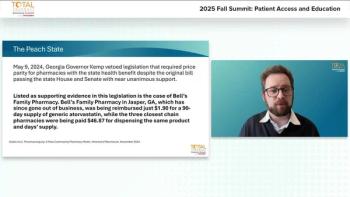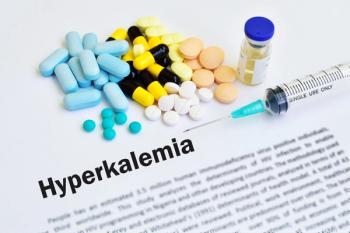
David Nau, BSPH, PhD, discusses evolving landscape of pharmacy, highlighting resilience, innovation, and new opportunities for future pharmacists in a changing health care world.
Ashley Gallagher is an assistant managing editor at Drug Topics®. She graduated in 2020 in journalism and mass communications and received her master’s degree in 2025 in digital journalism from St. Bonaventure University. Previously, she worked as a pharmacy technician for a retail chain.

David Nau, BSPH, PhD, discusses evolving landscape of pharmacy, highlighting resilience, innovation, and new opportunities for future pharmacists in a changing health care world.

Pharmacists evolve by enhancing skills, embracing AI, and focusing on patient care, ensuring relevance in a changing health care landscape.

Further, they found weight loss prior to 75-g oral glucose tolerance test was a preventive factor for both impaired glucose tolerance and diabetes.

Amgen launches AmgenNow, which is a new direct-to-patient program that will start with evolucumab.

Don Roosan, PharmD, PhD, discusses the ethical implications of AI in pharmacy, focusing on patient safety, transparency, and the importance of human connection in care.

Don Roosan, PharmD, PhD, discusses the changing technology, challenging conventional boundaries of pharmaceutical practice through telepharmacy and artificial intelligence.

Prior to the government shutdown, the FDA approved a generic version of mifeprisone without a public announcement.

This is the first Bruton tyrosine kinase inhibitor FDA approved for chronic spontaneous urticaria.

This month, Drug Topics® explores a new avenue of pharmacy each week, including AI technology, student education, innovative community services, and the expansion of clinical care.

Since 2016, the rate of gabapentin prescribing slowed but is still increasing, especially for women and older adults.

This marks the first and only IL-23 approval for these indications in pediatric populations.

Pharmacists are on the front line for patients looking to self-manage their menstrual pain, making their role invaluable in women’s health.

The study results highlight the importance of pneumococcal vaccination for patients with chronic respiratory diseases, particularly chronic obstructive pulmonary disease.

Investigators examine the effects of combination therapy with metformin combined with sodium-glucose cotransporter-2 inhibitors, dipeptidyl peptidase-4 inhibitors, or thiazolidinediones.

Further, after the introduction of the pneumococcal conjugate vaccine 10, investigators note a decrease of infections caused by multidrug resistance infection.

As part of this announcement, the administration launches initiatives across the National Institutes of Health, the FDA, and the Center for Medicare & Medicaid Services.

The vote for state and local jurisdictions requiring a prescription for administration of COVID-19 vaccines failed after a tiebreaker vote from the committee chair.

Bumetanide nasal spray is available in 0.5 mg, which is an alternative to traditional oral and intravenous formulations for outpatient therapies.

Dani Markus, PharmD, MBA, discusses the importance of technology in the modern pharmacy era and how it's helping community pharmacists become central figures in health care.

Shantel Upshaw Houston, PharmD, discusses the vital role of pharmacists in bridging health care gaps and fostering community connections to improve patient care.

Tripp Logan, PharmD, and Jake Galdo, PharmD, discuss the nuances behind community pharmacy practices and the importance of understanding patient, policymaker, and provider perspectives.

FDA approves ruxolitinib cream for children with atopic dermatitis, offering a new nonsteroidal treatment option for better symptom management.

The recommendations are provided through the West Coast Health Alliance and pull from guidance from the American Academy of Pediatrics and other organizations.

Hyperkalemia, chronic kidney disease, and hypertension often don’t manifest until the diseases become chronically uncontrolled, according to Ralph J. Riello III, PharmD, BCPS.

The FDA also grants the biosimilar provisional interchangeability designation, making the drug substitutable at the pharmacy level.

Pharmacists enhance menstrual pain management by integrating holistic strategies, empowering women with personalized care and evidence-based guidance for better health outcomes.

Joanna Lewis, PharmD, MBA, discusses effective strategies for managing menstrual pain, including nonsteroidal anti-inflammatory drugs and supplements to enhance comfort and quality of life.

Approximately half of patients achieved a 50% or greater reduction from baseline monthly migraine days and sustained the response.

However, a large majority of parents in the US believe routine childhood vaccines, such as the measles, mumps, and rubella vaccine and polio vaccine, are safe and important.

Merck’s pneumococcal 21-valent conjugate vaccine was noninferior to the pneumococcal 23-valent polysaccharide vaccine for all 12 shared serotypes and superior to 9 unique serotypes.